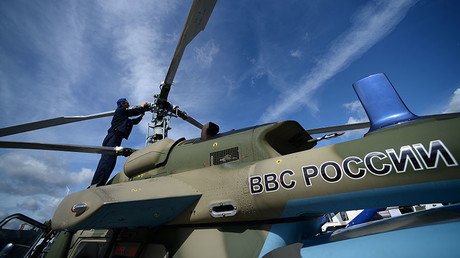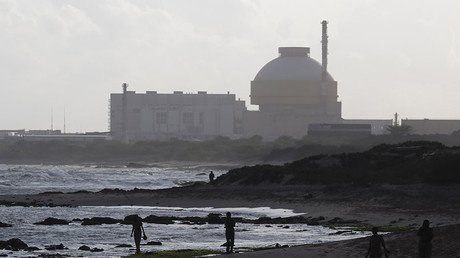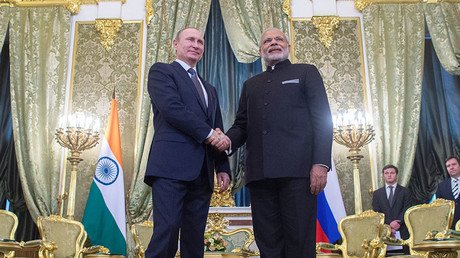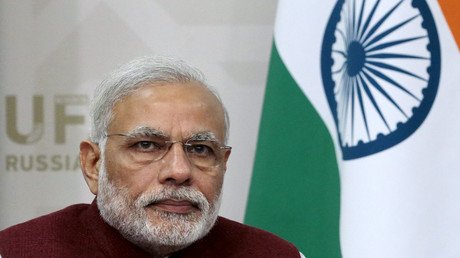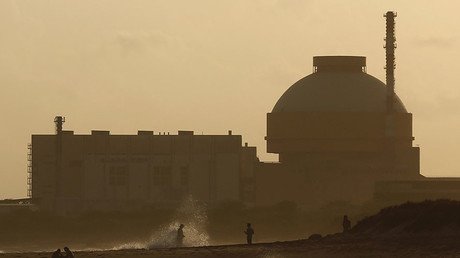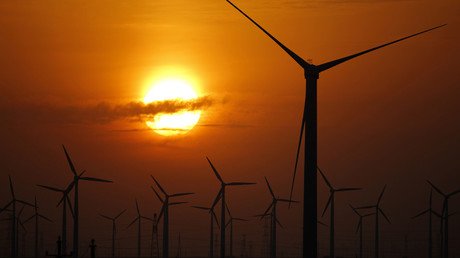‘TTIP is non-transparent, protectionist deal’: Putin interview ahead of India visit
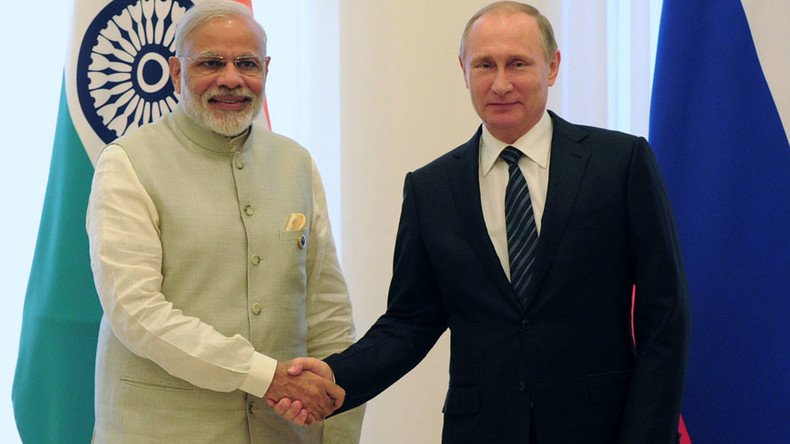
Ahead of his visit to India, President Vladimir Putin talked to Rossiya Segodnya and IANS news agencies on the ties between the two nations and their work within the BRICS group. He admitted the world still feels the past global financial crisis, but said that protectionist projects such as TTIP are “unfortunate.”
Question: Russian-Indian relations can be qualified as privileged strategic partnership. As to the economy, a perfect example of this point is cooperation in atomic energy, I particular, the construction of the Kudankulam NPP. What other areas of Russian-Indian cooperation can speak to a similar success?
President of Russia Vladimir Putin: India is Russia's especially privileged strategic partner. Cooperation between our countries is making good headway in all areas on the basis of strong traditions of friendship, trust and mutual respect.
Russia and India are allies in ensuring strategic security and stability, and building an equitable world order. We work closely within the leading multilateral organisations such as BRICS, the G20, and the UN.
This October marks 16 years of the signing of the key instrument for Russian-Indian relations, the Declaration on Strategic Partnership. We have done much to further the entire mechanism of bilateral ties during this period.
The two countries maintain active political dialogue, with summits taking place every year. The Intergovernmental Commission on Trade, Economic, Scientific, Technical and Cultural Cooperation is also working efficiently. Our foreign ministers, heads of staff of security councils and line ministries keep in touch on a regular basis. There is a gradual increase in inter-parliamentary, interregional, business and humanitarian exchanges. We have developed a strong legal framework featuring over 250 agreements.
India has been and remains Russia's major foreign trade partner. Even though in 2015 trade between the countries dropped by 7.8 percent, together with our Indian partners, we are resolved to overcome the negative trend, which, in our opinion, is largely associated with volatility on the global markets and in exchange rates. Especially since our commercial exchanges are mutually beneficial and their structure shows the complementarity of the two economies. Chemicals and engineering products account for a considerable share of Russia’s exports and the exports from your country.
The energy sector plays an important role in trade and economic cooperation between Russia and India. Construction of the Kudankulam NPP is the largest long-term project. In August 2016, Prime Minister Narendra Modi and I took part in a ceremony dedicated to the handover of the first unit of the Kudankulam NPP to the Republic of India. The second unit will be put into operation in the near future. Operation of the first and second units at their rated capacity will significantly increase the energy supply in India and strengthen its energy security.
Rosatom State Atomic Energy Corporation and the Nuclear Power Corporation of India began preparations for the construction of units 3 and 4. Works are being carried out according to the agreed schedule. The project is implemented with funding from the Russian Federation: the government loan stands at $3.4 billion, or 85 percent of the total value of contracts concluded with the Russian organisations. We are now working on the localisation of component manufacturing in India. We began assessing the construction of nuclear power plants at other sites in India. Technological cooperation in the field of uranium enrichment is being established.
We are strengthening bilateral cooperation in the conventional energy sector. During the St Petersburg International Economic Forum held in June 2016, Rosneft and an Indian consortium signed a contract for the sale of 23.9 percent of shares in Vankorneft, which owns the Vankor field in the Krasnoyarsk Region. Besides, Rosneft sold a stake of shares in the Taas-Yuryakh Neftegazodobycha, a company developing a field in East Siberia, to Indian companies.
Improving the structure of goods turnover by increasing the deliveries of high technology products and developing industrial cooperation is a topical issue. Well-known Russian companies, such as Silovye Mashiny, Gazprom, Stroytransgaz, Novolipetsk Steel (NLMK), Uralmashzavod, SIBUR Holding, Mechel, KAMAZ and many others, are operating in the Indian market.
Implementation of large promising projects is underway in engineering, chemical and mining industries, aircraft engineering, pharmaceuticals, medicine, nano- and biotechnology. Cooperation in finance and banking, which involves, among others, the VTB Bank and Sberbank of Russia, is advancing. It is obvious that the Russian companies see real prospects and high attractiveness of the Indian market.
Our countries actively collaborate in the military technical field. Russia remains in the lead in terms of both direct supplies of most advanced weapons and military equipment and conducting joint researches with India, as well as producing goods for military purposes. The construction of the BrahMos supersonic cruise missile and the development of a new, fifth generation fighter aircraft are mong the successful joint projects.
READ MORE: Russia, India expected to agree deals worth up to $150bn
Let me add that many of the Russian projects in India not only have commercial importance but also play a significant social and economic role for the economies of the two countries. They harmoniously fit in the new Indian industrialisation programme proposed by Mr Modi.
Question: The level of investment cooperation is one of the criteria of reliable bilateral relations and trust between countries. In this regard, what steps are planned to be taken in view of the upcoming Russian-Indian Summit? Will the plans to privatise Russian companies influence the development of the investment partnership between Russia and India?
Vladimir Putin: Naturally, during our visit to India we hope to give fresh momentum to the bilateral trade and economic ties, given that companies of both countries are interested in implementing new mutually beneficial projects. Russia's cumulative investments in India amount to about $4 billion, while Indian businesses have invested in the Russian economy twice as much – about $8 billion.
I am convinced that Russia and India can considerably boost bilateral investments. To stimulate mutual investments, we plan to discuss with our Indian partners the possibility of updating the bilateral Agreement for the Promotion and Mutual Protection of Investments. We encourage the development institutes – the Russian Direct Investment Fund and Vnesheconombank – to be more active in providing financial support for investment activities of the Russian companies.
A Working Group on Priority Investment Projects has been established and is now successfully operating within the framework of the Intergovernmental Commission. Line agencies of the two countries, jointly with the India–Russia Forum on Trade and Investment, are engaged in a rigorous selection of promising business initiatives and work on identifying and removing barriers to the free flow of goods, capital and services.
To date, 20 priority projects have been selected – 10 Russian projects and 10 Indian ones – in such spheres as transport engineering, chemical industry, aircraft industry and pharmaceuticals. They include the construction by the SIBUR Holding of a butyl rubber facility with an operating capacity of 100,000 tonnes per year in the city of Jamnagar, and production by Russia’s Lighting Technologies Company of lighting equipment for general and specific purposes in the city of Jigani, Karnataka state. The Sistema Financial Corporation is developing a ”smart city“ model in India. Dauria Aerospace is working on the deployment of the NextStar telecommunication satellite constellations in the geostationary Earth orbit. The two countries’ governments will assist in the implementation of these projects.
Question: BRICS summits have been already included on the global agenda, and are held regularly. Yet, the final declarations only slightly differ from summit to summit. What do you think is essential in order to make BRICS cooperation more substantial, effective and concrete?
Vladimir Putin: BRICS is one of the key elements of the emerging multipolar world. The five countries have consistently reaffirmed their commitment to the fundamental principles of international law and promote the central role of the United Nations. Our countries reject the policy of coercive pressure and infringement upon the sovereignty of other states. We take similar stances on urgent international issues, including the Syrian crisis and the Middle East settlement.
This is why the summits’ final declarations, and the Goa Summit will be no exception to this rule, reaffirm our shared commitment to the fundamental principles of inter-state communication, particularly, to the observance of international law with the central coordinating role of the UN. With some Western countries attempting to promote their unilateral approaches, this position becomes even more relevant.
Traditionally, the declarations of BRICS leaders outline fundamental consensus-based stances on a wide range of issues and identify short-term development goals for the five nations that would serve as a target for follow-up steps aimed at strengthening strategic partnerships among our countries in various spheres.
As for rendering practical interaction among the five countries more substantive, I would like to stress that today, there exist more than 30 formats for inter-agency cooperation in the political, economic, humanitarian, security and law enforcement areas.
The establishment of the New Development Bank (NDB) and the BRICS Contingent Reserve Arrangement with the total capital of $200 billion is a concrete example of this cooperation. I am convinced that, as the bank gets stronger, its output will only increase, including by means of projects that promote integration among the BRICS countries. The NDB started its work in 2016, having approved the first projects in all five countries. The priority at the current stage is renewable energy. In Russia, this implies the construction of small 50 MW hydropower plants in Karelia worth $100 million.
Our countries actively cooperate within the Group of 20, including under the current Chinese chairmanship. Thus, the BRICS countries have undertaken a commitment to implement the Action Plan on Base Erosion and Profit Shifting. We seek to systematically converge our stances in the WTO with a view to improving the rules and spurring up multilateral negotiations within the organisation.
This is why I think the cooperation within BRICS has already begun to yield practical results. It is essential to continue work on consolidating these results and on identifying areas of common interest.
The participants in the BRICS Summit in Goa will look at the initial results of implementing the Strategy for BRICS Economic Partnership adopted in Ufa and finalise the draft of BRICS Roadmap for Trade, Economic and Investment Cooperation until 2020. We intend to establish new formats and mechanisms to cooperate with our partners, in which concerted measures aimed at developing our ties in various fields will be elaborated. At the same time we intend to focus on addressing issues related to strengthening international security and stability, enhancing the competitiveness of our economies and the promotion of international development.
We also support the initiatives put forward by the Indian chairmanship in such fields as BRICS collaboration in agriculture, railway transport, sports, tourism and building people-to-people contacts.
Question: What proposals are you going to make at the forthcoming BRICS Summit and what do you expect from this meeting? What do you think the participants in the association could claim as their achievements after this meeting? What other projects beside the New Development Bank, could serve as a proof that this cooperation format is valuable?
Vladimir Putin: First and foremost, I would like to express gratitude to Indian leadership who has, invariably throughout its chairmanship in BRICS, focused on strengthening and consolidating the strategic partnership within our association. I am convinced that the Summit in Goa that will be held under the slogan of continuity and innovation, will be very fruitful.
For our five countries’ leaders this meeting will be a good opportunity to harmonise our positions on key issues on the international agenda. We are determined to cooperate in the fight against terrorism, drug trafficking and corruption. We will also contribute to settling conflicts and ensuring international information security. All of us remain concerned over continued lack of stability in the global economy. Together with our partners we will reflect on what can be done to further unite our efforts in order to address these challenges.
We also expect that the BRICS Summit in Goa will open new opportunities for economic and humanitarian cooperation.
We will certainly discuss the issues of project funding through the New Development Bank and of a full-fledged launch of the BRICS Contingent Currency Reserve Pool. This implies an exchange of views on the ongoing work involving high representatives on security issues, relevant ministerial meetings, expert interaction formats, the BRICS Network University, and the Business Council. For instance, preparations have now been completed for the signing of memoranda of cooperation among the customs services and the diplomatic academies of our states, as well as of creating a platform for BRICS agricultural research.
We are grateful to our Indian partners for ensuring the continuity of the BRICS agenda following the Ufa Summit held in Russia in July 2015. The implementation of the adopted Ufa Declaration and Action Plan has started. The Indian partners have also proposed a number of initiatives that we plan to consider at the Summit.
As for the specific Russian proposals for the Goa Summit, let me remind you that, during our presidency, the Strategy for Economic Partnership was adopted, which covers the promising areas of cooperation among the five countries. An action plan for its implementation is currently being prepared. The Russian side has proposed more than 60 projects, a kind of a road map, which could be implemented in cooperation with its BRICS partners (with a single partner or with all of them). I believe that if we manage to jointly determine partners for the implementation of these projects, it will be an important step towards the modernisation of our countries’ economies.
Russia also supports enhanced cooperation in electronic commerce (including analysis of key barriers between the countries in this sphere, development of the best regulatory practices, etc.), in trade facilitation (with involvement of the Eurasian Economic Commission), supporting small and medium-sized businesses (launching a web portal for BRICS small and medium-sized businesses), and protection of intellectual property.
Question: You often mention the necessity to interlink integration processes, particularly those of the EAEU and the Silk Road Economic Belt. How could the current BRICS format be used to implement such initiatives?
Vladimir Putin: The global economic and financial situation remains difficult, with the consequences of the global financial crisis still persisting. It is therefore regrettable that certain countries seek to solve the problems that have built up by introducing protectionist measures and trying to engage in restricted non-transparent projects, such as the Trans-Pacific Partnership or the Transatlantic Trade and Investment Partnership. Russia, just like all its BRICS partners, remains committed to shaping open non-discriminatory economic areas based on the WTO principles.
Let me remind you that on July 9, 2015, Ufa hosted an outreach meeting with participation of heads of state of the Eurasian Economic Union, the SCO, as well as the SCO observer states. Among other things, the participants discussed the issue of major regional and transregional infrastructure projects.
In this context, we also proposed that work on establishing the Eurasian Economic Union should be integrated with that on the Silk Road Economic Belt. This process could eventually provide a basis for the Big Eurasian Partnership that would involve a wide range of states of the Eurasian Economic Union, the SCO, and ASEAN. We expect that such partnership will be open for accession by all countries concerned and will build on the principles of transparency and mutual respect. The BRICS cooperation potential may also be used to implement this initiative. We look forward to the support from India, which is earnestly interested in this proposal.
We are sure that this topic will be further discussed at the BRICS and BIMSTEC heads of state meeting in Goa.
Question: When you think of the territory from India to the Russian border you realise that the situation there is rather complicated, with numerous problems and contradictions. What challenges and issues, in your opinion, will be the most important and acute for the countries of the region in the next ten years?
Vladimir Putin: The situation on the territory between India and Russia remains tense. In particular, the developments in Afghanistan still raise concern. Decisive actions are required to help that country in dealing with such challenges and threats as terrorism, extremism, and illicit drug trafficking. Russia and India share the need to support national reconciliation efforts under the international law and are interested in deepening constructive multilateral cooperation for the purposes of assisting Afghanistan in solving the issues of national security, building counter-narcotics capacity, ensuring social and economic development, and enhancing interconnectivity.
In more general terms, our country is willing to develop such formats of interaction in the above-mentioned region that would allow responding swiftly to emerging security challenges, jointly seeking for ways to address potential threats. In our opinion, the Shanghai Cooperation Organisation is to play the major role in it; it is constantly expanding its geography – for example, India and Pakistan are now joining the Organisation. The SCO is stepping up its efforts aimed at building trust, strengthening genuinely collective efforts in the area of crisis response, and developing multifaceted cooperation.
The fact that Russia, with support of its partners, is actively promoting the above-mentioned projects to create a common economic space in Eurasia also contributes to resolving the differences. Such ‘integration of integrations’ based on the principles of transparency and taking into account the interests of all national economies will allow integrating the region into common development, and will strengthen its stability.
